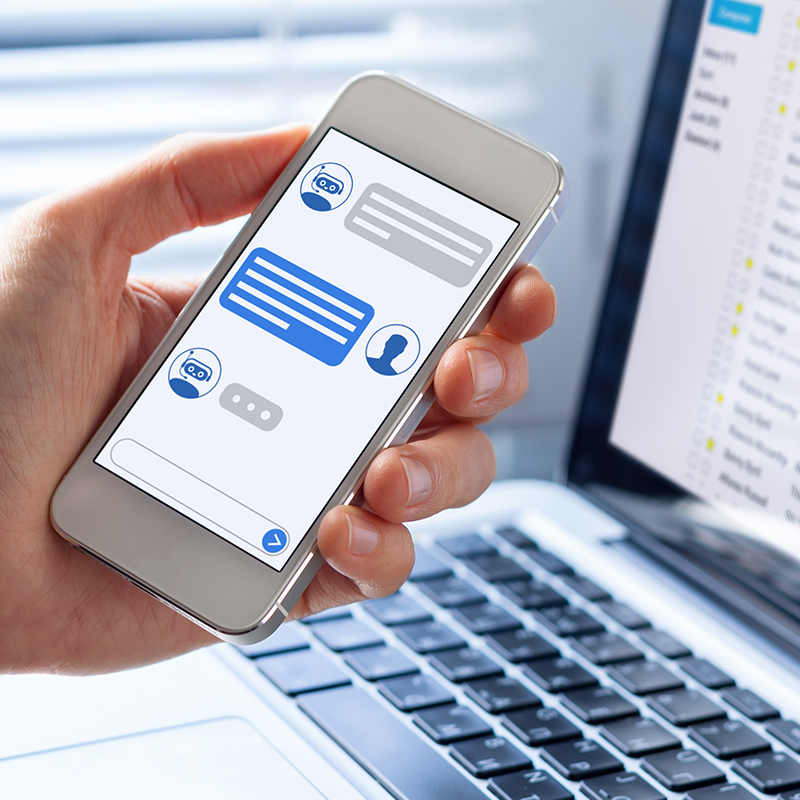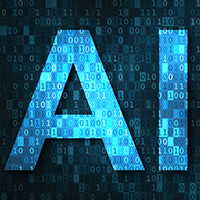
You have likely engaged with chatbots at some point in your daily life without even realizing it. For example, you’re on a website looking for a product, and a window opens up on your screen asking if you have any questions and need any assistance. Or you may have used customer support live chats to inquire about your order, delivery dates, or issues. In both of these scenarios, you may have come across a chatbot.
What is an AI chatbot?
An AI chatbot is a computer program that uses Artificial Intelligence to enable human conversations via text or speech. AI chatbots are integrated into many different industries to provide customer support and guide users through the website, allowing them to interact with digital apps and services without human agents. From answering simple queries to helping customers with sales processes, AI chatbots learn based on the inputs they receive, process information, and use this knowledge to anticipate needs and deliver more personalized recommendations.
How does an AI chatbot work?
AI chatbots use natural language processing and machine learning to engage in conversations with people by interpreting their intent. First of all, AI chatbots try to understand the sentence structure, then process the collected data patterns and, over time, get better at answering the queries.
At a basic level, AI chatbots operate in the following order:
Step one – receive an input
A user enters their question or command into an AI bot through an app, website, or other channels.
Step two – analyze the request
After receiving the content, the bot uses natural language processing to find out the purpose of the message and interpret the user’s intent.
Step three – make a reply
The AI chatbot breaks down the question into smaller parts and compares each part to the database of previously submitted queries to find the most satisfying results for similar cases.
Choosing the best AI chatbot for your business

AI chatbots provide great benefits both for businesses and customers. Chatbots are valuable as they can quickly handle customer queries with minimal human intervention. AI bots can actually reduce operational costs by up to 30% and are a cost-effective alternative to hiring support professionals while offering convenience and boosting operational efficiency.
Chatbots allow businesses to scale by engaging with an unlimited number of customers in a humanlike way. As a brand communication channel, AI bots are expected to save businesses around $8 billion by 2022, according to Juniper research.
If you’re looking to implement a chatbot into your business to enhance customer interactions, improve lead generation or else use it to benefit other areas of your business, here are a few considerations to look at.
- Define your goals
First of all, you need to define the exact tasks or areas you’re going to automate through a chatbot so that it aligns with the goals of your business. Also, it’s important to think about your target audience to identify the real needs of your customers and make sure that the chatbot understands the preferences of your audience.
- Learning and interaction capabilities
AI chatbots should know when it’s the right time to begin a conversation and interact with customers. So make sure that the bots are programmed to learn and remember the context of conversations, record user interactions to support business conversations of different complexity as and when needed.
- Easy integration
When leveraging chatbots into your business, ease of integration is one of the most important factors. Check that the chatbot platform will work well with all your systems without any additional technical requirements.
- Natural Language Processing and speech support
It’s important to ensure that the chatbot is trained to comprehend customer’s intent and provide relevant answers in a way that’s natural and humanlike. So to be able to understand customer’s needs, learn from the collected data over time and also use the right tone for interacting with customers, the bot should incorporate NLP and speech support.
- Domain knowledge
If your bot lacks industry experience and domain knowledge, it will not be able to fully support your customer queries. So try to choose a service provider that can provide the platform with sufficient industry experience to meet even the most specific requests.
- Chatbot security
When choosing a third-party bot for your business, make sure that it comes with a high level of security to protect the information sent and received. Any communication exchanged via chatbot should be encrypted to keep user data private and secure.
Pros and cons of AI chatbots

The global chatbot market is growing and is predicted to reach $ 454.8 million in revenue by 2027. Companies are actively investing in AI chatbots because of the many benefits they can offer to businesses. So let’s see what are the key benefits of AI bots:
- 24/7 customer service and availability
AI bots can provide assistance even during off-business hours as they don’t require sleep time and are available 24/7 without any fixed working hours. So whenever the customer has an inquiry, an AI bot is available to give instant answers.
- Managing multiple requests
Live agents can handle a few requests at a time, but they need time to concentrate and respond back.
On the other hand, AI bots can handle multiple chats at once and provide quick answers to basic inquiries.
- Cost-effective
Chatbots are an affordable way to automate customer service and assist in handling customer inquiries without involving live agents. Chatbots can save businesses time and money, optimize costs and increase response times.
- Multiple language support
One of the greatest benefits of chatbots is that they can deliver chats in multiple languages. With the help of these bots, companies can save lots of time and money instead of hiring multilingual customer service representatives, while customers can use the language they are most comfortable with for interaction. As a result, companies can reach a wider audience and provide a more personalized customer experience.
Along with all these benefits, chatbots still lack some features that customers are looking for. Here are a few cons of using chatbots:
- Difficulty in processing complex questions
Chatbots are trained to answer basic questions that exist in the database. If the question is too specific and outside of the scope of those available in the database, the chatbot may not understand it. This can lead to upset customers and will negatively impact the brand.
- Lack of human factor
Chatbots lack any emotions and empathy, which can be really frustrating for customers who expect the company to understand their unique needs and provide a personalized experience. If the bot is not able to improvise and give solutions to complex issues where a human touch is needed, this will definitely decrease customer satisfaction.
- Setup and maintenance costs
Chatbots are programmed differently for specific business needs, which increases the initial installation costs. Also, chatbots need to be regularly updated according to changing priorities which requires additional resources and optimization. So AI bots need regular maintenance to meet the constantly changing expectations of businesses and customers.
In which industries are AI bots used?
Chatbots can be found in almost any industry and marketplace. As an Outgrow report states, 80% of businesses are expected to integrate some form of chatbot in their business model by 2022. Among the industries that can most benefit from implementing chatbots are e-commerce, retail, marketing, food, travel and hospitality, banking and finance, healthcare, and insurance.
As the use of AI bots becomes more widespread, they will readily be implemented into more business processes offering a more convenient and personalized customer experience for the sectors they work the best.
By Siranush Andriasyan

SmartClick is a full-service software provider delivering artificial intelligence & machine learning solutions for businesses.


